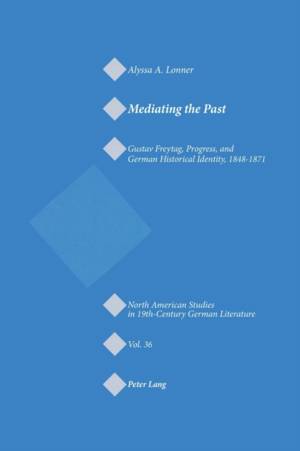
- Afhalen na 1 uur in een winkel met voorraad
- Gratis thuislevering in België vanaf € 30
- Ruim aanbod met 7 miljoen producten
- Afhalen na 1 uur in een winkel met voorraad
- Gratis thuislevering in België vanaf € 30
- Ruim aanbod met 7 miljoen producten
Zoeken
Mediating the Past
Gustav Freytag, Progress, and German Historical Identity, 1848-1871
Alyssa Lonner
€ 60,95
+ 121 punten
Omschrijving
As one of the most widely read German authors of the nineteenth century, Gustav Freytag (1816-1895) continues to be associated with the middle class and the progress it enjoyed. Yet while his best-selling novel Soll und Haben (1855) and its lesser-known successor Die verlorene Handschrift (1864) owed their vast commercial success largely to their buoyant message of bourgeois advancement, they simultaneously devote significant attention to elements of traditional German society. In exploring Freytag's dual roles as both a novelist of contemporary middle-class life and a cultural historian, this book uncovers the author's divergent - and ostensibly conflicting - desire both to embrace progress and commemorate the past. Investigating his literary engagement with three central elements of Germany's historical identity - the pervasiveness of folk beliefs, a strong identification with rural life, and the continued presence of the aristocracy - this study shows how Freytag attempts to locate these constituents of pre-industrial Germany in a modern, industrial nation, and in doing so contributes to a historically anchored national identity in which material and political progress coexist with a rich heritage and ancient traditions.
Specificaties
Betrokkenen
- Auteur(s):
- Uitgeverij:
Inhoud
- Aantal bladzijden:
- 260
- Taal:
- Engels
- Reeks:
- Reeksnummer:
- nr. 36
Eigenschappen
- Productcode (EAN):
- 9783039103317
- Verschijningsdatum:
- 20/07/2005
- Uitvoering:
- Paperback
- Formaat:
- Trade paperback (VS)
- Afmetingen:
- 152 mm x 229 mm
- Gewicht:
- 353 g

Alleen bij Standaard Boekhandel
+ 121 punten op je klantenkaart van Standaard Boekhandel
Beoordelingen
We publiceren alleen reviews die voldoen aan de voorwaarden voor reviews. Bekijk onze voorwaarden voor reviews.











